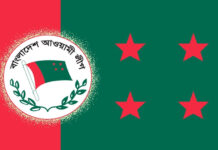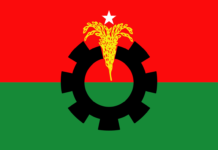BNP is not in a good shape, but what about Awami League
 Awami League general secretary Obaidul Quader and BNP secretary general Mirza Fakhrul Islam Alamgir tried to revive the country’s politics ahead of Eid by exchanging a few tough words. Mirza Fakhrul urged leaders and activists of his party to bounce back by strengthening their backbone to end the existing misrule. Quader, on the other hand, raised the question whether BNP men have any backbone whatsoever.
Awami League general secretary Obaidul Quader and BNP secretary general Mirza Fakhrul Islam Alamgir tried to revive the country’s politics ahead of Eid by exchanging a few tough words. Mirza Fakhrul urged leaders and activists of his party to bounce back by strengthening their backbone to end the existing misrule. Quader, on the other hand, raised the question whether BNP men have any backbone whatsoever.
No matter how strong the ruling party’s backbone is, democracy falters if the opposition party does not have any backbone. Both ruling and opposition party are essential components of democracy.
The people do not seem to be inspired by the rhetoric of political leaders nowadays. Politics has never been in such a frail state of bankruptcy since independence. This is true for both the ruling and the opposition party.
There are four kinds of political parties in Bangladesh’s political sphere now. One: ruling Awami League. Two: opposition BNP and its allies. Three: reluctant opposition parties such as Jatiya Party and minor parties of 14-party alliance. None of these parties wanted to be in the opposition. But their alliance leader Awami League unequivocally made it clear that they do not have a place in the government this time. They did not manage a berth in the government and remained reluctantly in opposition. Four: the opposition parties which failed to win any seat in the parliament.
Before the 11th general election, Awami League leaders used to say that BNP will be their main competitor as the party was in power thrice. Surprisingly, the party and allies got only 8 seats in 30 December election even though JaPa bagged 22. BNP alliance’s seat further slashed to 7 as Mirza Fakhrul did not take oath. The number remains 8 if BNP’s reserved seat MP Rumeen Farhana is counted.
Awami League leaders and their supporter intellectuals try to attribute such one-sided election results to BNP activists’ absence from campaign race. They contend that the opposition activists should have been in the field despite government repression. They seem to have forgotten Awami League’s brave soldiers’ retreat after their election drubbing in 2001 and again during 1/11 regime in 2007-08. The party cadres, whose wrongdoing were instrumental behind Awami League’s defeat in 2001, left the country at the first chance. Meanwhile, BNP-Jamaat cadres unleashed repression on minorities.
Election is a certified way for people to choose their representatives under a democratic system. I want to ask them with due respect, why should there be violence or killing centering election? Awami League leaders no more criticise the rigging happened in elections during Zia-Ershad or Khaleda regime vociferously or they have lost moral ground to do so.
AL leaders are continuing their sermons to BNP on ‘do’s and don’ts’. Some are even regretting BNP’s present feckless condition. But, they would have also realised the miserable condition of their associate bodies, had they concentrated more on their own politics instead of being too worried about BNP. Factional clashes of affiliated wings are flagging their politics. Many district and upazila committees are rendered dysfunctional. Conflict between ministers and MPs, MPs and upazila chairmen, and upazila chairmen and vice-chairmen is everywhere.
A report published in Bangladesh Pratidin on 30 May indicates the intensity of AL’s factional clashes. According to the report, at least 17 leaders and activists of the ruling party were killed after 11th parliamentary election. Of them, two were killed centering upazila election, 12 in factional clashes, 2 over business related conflict and one over cutting trees. Locals said those killings took place for party posts, establishing supremacy, controlling tenders and extortion. Political analysts think, those killings were precipitated from a tendency to grab personal gain by ruling party men as the opposition parties are inactive. (30 May, 2019, Bangladesh Pratidin)
AL’s joint secretary Abdur Rahman maintained that the root of these conflicts is deterioration of social values rather than politics.
Does it mean a party like AL has fallen prey to deterioration of values? People cannot but worry if the ruling party men become victims of moral degradation and unleash violence. No matter if AL leaders say, election rigging is also a political and moral degradation.
Jubo League chairman Omar Faruque Chowdhury in a newspaper statement urged the authorities to take legal action against anyone who resorts to take extortion using his or his party’s name. This proves that extortion is being taken using his or Jubo League’s name. According to a report published in Jugantor on 23 April, a Narayanganj Jubo League leader named Nazrul was arrested in a case filed over taking extortion of Tk 10 million. Narayanganj detective branch (DB) of police arrested him.
Bangladesh Chhatra League, another associate body of AL, is hogging the news headlines every day for their negative activities. Sometimes, for clashes over party posts, sometimes for attacking Dhaka University Central Student Union’s (DUCSU) elected vice president Nurul Haque Nur. How many times that lanky student leader was beaten by BCL cadres is beyond count. He was hospitalised following Bogura BCL activists’ attack on him recently. Earlier, Cumilla BCL activists barred him from attending an iftar party and kept him locked up in a room. AL secretary Obaidul Quader asked BNP not to do iftar politics. Nurul would not have been beaten, had Quader given this suggestion to BCL instead of BNP.
AL is the putative beneficiary of the 30 December election. But the scar of that the election has caused will not likely to be dissipated in the foreseeable future. Politics itself is the worst victim rather than any particular party. Politics is the driving force in democratic system. But, politics is being controlled by vested quarters now.
It is not unusual for BNP to be caught by frustration and confusion after the loss they experienced in 30 December election. Moreover, the party’s chairperson is incarcerated. But, the ruling party’s grassroots leaders and representatives have also been experiencing a different type of frustration and confusion. Some vented their frustration in informal discussions. But they are incapable of voicing their disappointment aloud. This ineffable situation is the biggest failure of seven-decade-old Awami League.
Some might contend that inclusion of 99 or 19 ‘controversial’ BCL leaders in its 301 member central body is their internal matter. But what can they say about involvement of 21 BCL leaders and activists in Dhaka University’s question paper leak?
BNP is in a sordid state after election defeat. But how good is Awami League’s condition despite their landslide victory?
* Sohrab Hassan is associate editor of Prothom Alo and a poet. This piece appeared in the print edition of Prothom Alo and has been rewritten in English by Galib Ashraf









